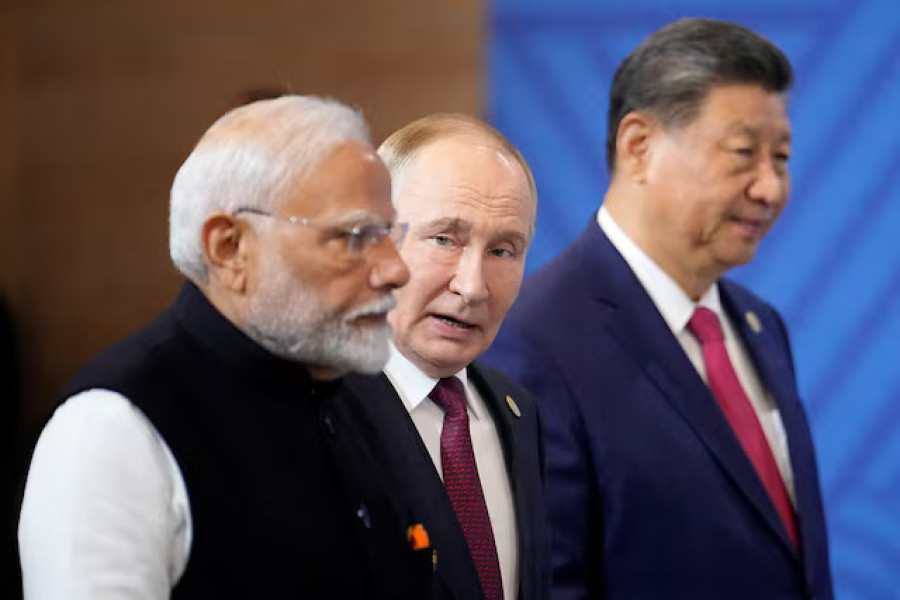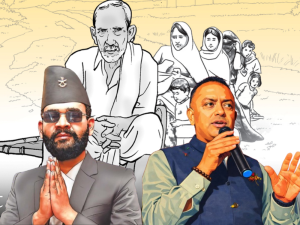Columns
What RIC troika means for Modi
Tariff war with the US puts Modi in a sticky spot, in terms of foreign policy and domestic political posturing.
Ruhi Tewari
The escalatory tariff war with the United States (US) and the belligerent tone of the Donald Trump administration have put India’s Narendra Modi government in a sticky spot, not just with respect to global diplomacy and strategic equations, but also from the point of view of its domestic constituency and political posturing.
The Bharatiya Janata Party (BJP) government’s drumbeating of making India a ‘vishwa guru (global leader)’ under Modi has been at the heart of India’s foreign policy messaging, particularly to its domestic audience. The sudden spectacle of the most powerful country, and what the Modi administration has claimed to be its ally all along, talking down to India and imposing harsh measures, therefore, threatens to puncture the balloon. It poses a tough challenge for the BJP government both in terms of balancing diplomacy and showcasing global power through other strategic friendships as well as managing domestic expectations.
The unexpected bonhomie with China after a few years of hostility and the show of camaraderie with Russia, therefore, are careful manoeuvers by PM Modi in that direction aimed at dual messaging—one, to the US and the global community and two, to his vote bank at home.
As a diplomatic decision, the pivot towards Russia and China is a strategic one, driven by the need to have some powerful allies as a show of strength to the US. But it is also born out of the need to convey a specific message to the Indian people and to assuage any doubts about Modi’s declining ability to steer the nation.
The ‘vishwa guru’ messaging
Modi has ruled India with a carefully curated image of being a ‘strong’ leader who has established a place for himself in the global order and developed close ties with powerful and influential world leaders. The BJP has consistently sold the idea of Modi being the one who could make India a global superpower, and the prime minister has made it a point to underscore his ‘friendship’ with the tallest world leaders.
For instance, ahead of the 2024 Lok Sabha elections, PM Modi made it a point to tout his leadership as being the only force capable of safeguarding India’s interests globally.
“This is an election to make India a big power in the world... When there is an atmosphere of war in the world, then a government working on a war footing is very important in India. In such a time, there should be a strong government, and only the BJP government with a full majority can do this," he said while addressing a public gathering.
In 2023, as he addressed the Parliament during a no-confidence motion, the prime minister said, “Today’s India neither comes under pressure nor accepts pressure. Today’s India does not bend before anyone.”
Following his massive mandate in the 2019 Lok Sabha elections, Modi held a rally in his home state, Gujarat, to iterate the message. “I see the next five years as a crucial and important time not only for Gujarat but also for the entire world. This is an opportunity for another renaissance that will make India a vishwa guru,” the PM said.
Modi has also made it a point to flaunt his friendship with world leaders, referring to them as his ‘dear friends’ time and again. He has particularly been keen to underline his warm equation with Trump, endorsing his candidature ahead of the US elections and congratulating him warmly on his win. “Congratulations my dear friend President @realDonaldTrump on your historic inauguration as the 47th President of the United States! I look forward to working closely together once again, to benefit both our countries and to shape a better future for the world. Best wishes for a successful term ahead,” he posted on social media platform X.
Effectively, a key pillar of the Narendra Modi dispensation’s campaign domestically has been his vision and capability to steer India into becoming globally influential, and his leadership being the country’s only shot at becoming a Vishwa guru.
The setback & the remedy
The rather unpleasant tariff war with the US and Washington DC’s frosty treatment of New Delhi have come as a major setback for the ruling regime in India. The diplomatic, trade and industry implications of it are massive, but an equally pertinent aspect for PM Modi is that of domestic politics.
One, it gives the opposition—now more united than ever before—a weapon to target him with. The PM’s rivals are unlikely to waste this opportunity to portray him as ‘weak’, unable to stand up to the US and his leadership as being incapable of protecting India’s interests. The opposition will have a field day trying to show how the PM had been snubbed by Trump, in effect attempting to puncture his image of being a strong leader.
Congress, the principal opposition party, has already begun taking jibes at the PM. Its senior leader Jairam Ramesh took to X and said that while the prime minister had coined the formula of ‘MAGA+MIGA=MEGA (Make America Great Again + Make India Great Again leading to a mega partnership)’ earlier this year, the “Modi-made MEGA has now become a MAHA headache for India”.
Two, it brings under a cloud Modi’s main projection to his electorate—of a strong leader with a “56-inch chest”. The PM needs to quickly recover from this bitter spat with his once dear friend Trump and make sure he has an answer for his voters.
To avert both these domestic disasters, the BJP-led government must project an image of relevance in the global order, showing it has allies among the great powers, even if not the US. The bonhomie with Russian President Vladimir Putin and Chinese President Xi Jinping, therefore, is likely to be as much a step in that direction as in being a strategic and diplomatic decision.
The camaraderie between Putin and Modi, meanwhile, with photographs of their car ride together splashed across, has further helped cement the message of India’s friendship with a big world power. The Russia-India-China axis, therefore, is Modi’s answer both to the US and to his domestic constituency.
Narendra Modi has built his rise in Indian politics on the projection of being a strong, decisive and fearless leader, and a key element of that has been his global diplomacy. Any setback to that, therefore, can cause as much of a dent in his domestic image as in India’s foreign policy.




 14.86°C Kathmandu
14.86°C Kathmandu

.jpg&w=200&height=120)













